Azure ML Experiments provide ways to read and write CSV files to Azure blob storage through the Reader and Writer modules. However, I need to write a JSON file to blob storage. Since there is no module to do so, I'm trying to do so from within an Execute Python Script module.
# Import the necessary items
from azure.storage.blob import BlobService
def azureml_main(dataframe1 = None, dataframe2 = None):
account_name = 'mystorageaccount'
account_key='mykeyhere=='
json_string='{jsonstring here}'
blob_service = BlobService(account_name, account_key)
blob_service.put_block_blob_from_text("upload","out.json",json_string)
# Return value must be of a sequence of pandas.DataFrame
return dataframe1,
However, this results in an error: ImportError: No module named azure.storage.blob
This implies that the azure-storage Python package is not installed on Azure ML.
How can I write to Azure blob storage from inside an Azure ML Experiment?
Here's the fill error message:
Error 0085: The following error occurred during script evaluation, please view the output log for more information:
---------- Start of error message from Python interpreter ----------
data:text/plain,Caught exception while executing function: Traceback (most recent call last):
File "C:\server\invokepy.py", line 162, in batch
mod = import_module(moduleName)
File "C:\pyhome\lib\importlib\__init__.py", line 37, in import_module
__import__(name)
File "C:\temp\azuremod.py", line 19, in <module>
from azure.storage.blob import BlobService
ImportError: No module named azure.storage.blob
---------- End of error message from Python interpreter ----------
Start time: UTC 02/06/2016 17:59:47
End time: UTC 02/06/2016 18:00:00`
Thanks, everyone!
UPDATE: Thanks to Dan and Peter for the ideas below. This is the progress I've made using those recommendations. I created a clean Python 2.7 virtual environment (in VS 2005), and did a pip install azure-storage to get the dependencies into my site-packages directory. I then zipped the site-packages folder and uploaded as the Zip file, as per Dan's note below. I then included the reference to the site-packages directory and successfully imported the required items. This resulted in a time out error when writing to blog storage.
Here is my code:
# Get access to the uploaded Python packages
import sys
packages = ".\Script Bundle\site-packages"
sys.path.append(packages)
# Import the necessary items from packages referenced above
from azure.storage.blob import BlobService
from azure.storage.queue import QueueService
def azureml_main(dataframe1 = None, dataframe2 = None):
account_name = 'mystorageaccount'
account_key='p8kSy3F...elided...3plQ=='
blob_service = BlobService(account_name, account_key)
blob_service.put_block_blob_from_text("upload","out.txt","Test to write")
# All of the following also fail
#blob_service.create_container('images')
#blob_service.put_blob("upload","testme.txt","foo","BlockBlob")
#queue_service = QueueService(account_name, account_key)
#queue_service.create_queue('taskqueue')
# Return value must be of a sequence of pandas.DataFrame
return dataframe1,
And here is the new error log:
Error 0085: The following error occurred during script evaluation, please view the output log for more information:
---------- Start of error message from Python interpreter ----------
data:text/plain,C:\pyhome\lib\site-packages\requests\packages\urllib3\util\ssl_.py:79: InsecurePlatformWarning: A true SSLContext object is not available. This prevents urllib3 from configuring SSL appropriately and may cause certain SSL connections to fail. For more information, see https://urllib3.readthedocs.org/en/latest/security.html#insecureplatformwarning.
InsecurePlatformWarning
Caught exception while executing function: Traceback (most recent call last):
File "C:\server\invokepy.py", line 169, in batch
odfs = mod.azureml_main(*idfs)
File "C:\temp\azuremod.py", line 44, in azureml_main
blob_service.put_blob("upload","testme.txt","foo","BlockBlob")
File ".\Script Bundle\site-packages\azure\storage\blob\blobservice.py", line 883, in put_blob
self._perform_request(request)
File ".\Script Bundle\site-packages\azure\storage\storageclient.py", line 171, in _perform_request
resp = self._filter(request)
File ".\Script Bundle\site-packages\azure\storage\storageclient.py", line 160, in _perform_request_worker
return self._httpclient.perform_request(request)
File ".\Script Bundle\site-packages\azure\storage\_http\httpclient.py", line 181, in perform_request
self.send_request_body(connection, request.body)
File ".\Script Bundle\site-packages\azure\storage\_http\httpclient.py", line 143, in send_request_body
connection.send(request_body)
File ".\Script Bundle\site-packages\azure\storage\_http\requestsclient.py", line 81, in send
self.response = self.session.request(self.method, self.uri, data=request_body, headers=self.headers, timeout=self.timeout)
File "C:\pyhome\lib\site-packages\requests\sessions.py", line 464, in request
resp = self.send(prep, **send_kwargs)
File "C:\pyhome\lib\site-packages\requests\sessions.py", line 576, in send
r = adapter.send(request, **kwargs)
File "C:\pyhome\lib\site-packages\requests\adapters.py", line 431, in send
raise SSLError(e, request=request)
SSLError: The write operation timed out
---------- End of error message from Python interpreter ----------
Start time: UTC 02/10/2016 15:33:00
End time: UTC 02/10/2016 15:34:18
Where my current exploration is leading is that there is a dependency on the requests Python package in azure-storage. requests has a known bug in Python 2.7 for calling newer SSL protocols. Not sure, but I'm digging around in that area now.
UPDATE 2: This code runs perfectly fine inside of a Python 3 Jupyter notebook. Additionally, if I make the Blob Container open to public access, I can directly READ from the Container through a URL. For instance: df = pd.read_csv("https://mystorageaccount.blob.core.windows.net/upload/test.csv") easily loads the file from blob storage. However, I cannot use the azure.storage.blob.BlobService to read from the same file.
UPDATE 3: Dan, in a comment below, suggested I try from the Jupyter notebooks hosted on Azure ML. I had been running it from a local Jupyter notebook (see update 2 above). However, it fails when run from an Azure ML Notebook, and the errors point to the requires package again. I'll need to find the known issues with that package, but from my reading, the known issue is with urllib3 and only impacts Python 2.7 and NOT any Python 3.x versions. And this was run in a Python 3.x notebook. Grrr.
UPDATE 4: As Dan notes below, this may be an issue with Azure ML networking, as Execute Python Script is relatively new and just got networking support. However, I have also tested this on an Azure App Service webjob, which is on an entirely different Azure platform. (It is also on an entirely different Python distribution and supports both Python 2.7 and 3.4/5, but only at 32 bit - even on 64 bit machines.) The code there also fails, with an InsecurePlatformWarning message.
[02/08/2016 15:53:54 > b40783: SYS INFO] Run script 'ListenToQueue.py' with script host - 'PythonScriptHost'
[02/08/2016 15:53:54 > b40783: SYS INFO] Status changed to Running
[02/08/2016 15:54:09 > b40783: INFO] test.csv
[02/08/2016 15:54:09 > b40783: ERR ] D:\home\site\wwwroot\env\Lib\site-packages\requests\packages\urllib3\util\ssl_.py:315: SNIMissingWarning: An HTTPS request has been made, but the SNI (Subject Name Indication) extension to TLS is not available on this platform. This may cause the server to present an incorrect TLS certificate, which can cause validation failures. For more information, see https://urllib3.readthedocs.org/en/latest/security.html#snimissingwarning.
[02/08/2016 15:54:09 > b40783: ERR ] SNIMissingWarning
[02/08/2016 15:54:09 > b40783: ERR ] D:\home\site\wwwroot\env\Lib\site-packages\requests\packages\urllib3\util\ssl_.py:120: InsecurePlatformWarning: A true SSLContext object is not available. This prevents urllib3 from configuring SSL appropriately and may cause certain SSL connections to fail. For more information, see https://urllib3.readthedocs.org/en/latest/security.html#insecureplatformwarning.
[02/08/2016 15:54:09 > b40783: ERR ] InsecurePlatformWarning
[02/08/2016 15:54:09 > b40783: ERR ] D:\home\site\wwwroot\env\Lib\site-packages\requests\packages\urllib3\util\ssl_.py:120: InsecurePlatformWarning: A true SSLContext object is not available. This prevents urllib3 from configuring SSL appropriately and may cause certain SSL connections to fail. For more information, see https://urllib3.readthedocs.org/en/latest/security.html#insecureplatformwarning.
[02/08/2016 15:54:09 > b40783: ERR ] InsecurePlatformWarning







